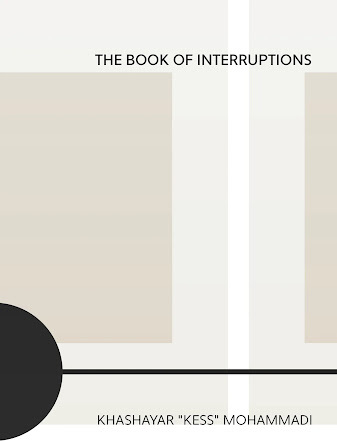Khashayar “Kess” Mohammadi, The Book of Interruptions
│││
I can no longer affordhumour
a spear knocks at mycaged heart and the rattles awaken a primal fear.
a marble floor, a marblebust, all the negative space potent within rock.
mandibles in an oyster ofsunlight within the sunflower. this sap.
there are things I can’tdo with words.
there are words that areflexed too far off the body.
clouds make way for theAlborz mountains to crack.
revealing millennia.
the sun
a temperament of thegreat flood.
the sun
makes new
the speech (“PsychoticNotebooks”)
 Thefifth full-length collection from queer, Toronto-based, Iranian-born poet, writer and translator Khashayar “Kess” Mohammadi, is
The Book of Interruptions
(Hamilton ON: Wolsak and Wynn 2025), following on the heelsof their full-length debut,
Me, You, Then Snow
(Guelph ON: Gordon HillPress, 2021) [see my review of such here], the dos-a-dos
WJD
[conjoinedwith The OceanDweller, by Saeed Tavanaee Marvi, trans. from the Farsi byMohammadi] (Gordon Hill Press, 2022) [see my review of such here], the collaborativeG (with Klara du Plessis; Windsor ON: Palimpsest Press, 2023) and solocollection
Daffod*ls
(Pamenar Press, 2023) [see my review of such here],as well as a plethora of chapbooks. Set with opening poem, “Before We Begin …,”and six sections—“Psychotic Notebooks,” “Purgatorial Imagery,” “There Needs toBe More to This Than Nostalgia,” “A Harmonious Armageddon,” “An Autobiography”and “Consonants* A Book of Visions*: A Book of Illuminations*: A Chorus of*L*ght: Against L*ght: Against L*ght”—The Book of Interruptions extendsMohammadi’s accumulations of space and spacings, writing a sequence ofinterruptions and disturbances, hiccups and self-sabotage, writing thepossibility and impossibly of words, language and meaning. “my mouth bubblingunder water // the narrator mentions me by name,” the opening of the sequence“Psychotic Notebooks” begins, “I am the cliffhanger // for one of a thousandnights before slaughter // having asked more questions than I have answered //in the city within the city I swerve // among the cacophony of the tunnel // anocean within an ocean [.]”
Thefifth full-length collection from queer, Toronto-based, Iranian-born poet, writer and translator Khashayar “Kess” Mohammadi, is
The Book of Interruptions
(Hamilton ON: Wolsak and Wynn 2025), following on the heelsof their full-length debut,
Me, You, Then Snow
(Guelph ON: Gordon HillPress, 2021) [see my review of such here], the dos-a-dos
WJD
[conjoinedwith The OceanDweller, by Saeed Tavanaee Marvi, trans. from the Farsi byMohammadi] (Gordon Hill Press, 2022) [see my review of such here], the collaborativeG (with Klara du Plessis; Windsor ON: Palimpsest Press, 2023) and solocollection
Daffod*ls
(Pamenar Press, 2023) [see my review of such here],as well as a plethora of chapbooks. Set with opening poem, “Before We Begin …,”and six sections—“Psychotic Notebooks,” “Purgatorial Imagery,” “There Needs toBe More to This Than Nostalgia,” “A Harmonious Armageddon,” “An Autobiography”and “Consonants* A Book of Visions*: A Book of Illuminations*: A Chorus of*L*ght: Against L*ght: Against L*ght”—The Book of Interruptions extendsMohammadi’s accumulations of space and spacings, writing a sequence ofinterruptions and disturbances, hiccups and self-sabotage, writing thepossibility and impossibly of words, language and meaning. “my mouth bubblingunder water // the narrator mentions me by name,” the opening of the sequence“Psychotic Notebooks” begins, “I am the cliffhanger // for one of a thousandnights before slaughter // having asked more questions than I have answered //in the city within the city I swerve // among the cacophony of the tunnel // anocean within an ocean [.]”Gesturaland expansive, there is an element of worldbuilding to Mohammadi’s lyric, onethat returns the structure to the crossed-out (or interrupted) vowel throughtheir use of the * symbol from prior work (specifically ), writing a narrativestructure concurrently fragmented, populated and isolated, swirling amidstaccato struggles with faith and cities, queer experience and a litany ofrestless, thoughtful observations around feeling unsettled in a secular Toronto,while holding on to a cultural history of the poem that connects to thatstretches back thousands of years. With each collection, Mohammadi furthers acomplexity of their engagement with the long poem, the book-length accumulatedlyric, a trajectory that is as striking as it is propulsive. And yet, each workbegins fresh, composed with an open curiosity, and an array of questions, somenew, and others, that need to be asked more than once, for the sake of a broader,even ongoing, response. As part of the sequence-section “Purgatorial Imagery,”as they write:
I began as a novice
to a city
long ago mastered
by a writer’s eventualplunge
into blindness
the instinct to pub-crawl
came from a differentbreed
and the black tome of thenight
painstakingly written tobe fed
as an offering to thelake
as if breadcrumbs toducks
whose soft glide
is the unfolding
of the universe
a betrayal
gods
idols
gods
stone
God
the parenthetical



